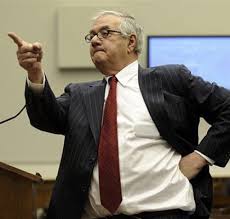brucefan
EOG Dedicated
Congressman Moves To Lift Ban On Online Gambling
<!-- teaser (dek) copy -->Chairman of the Financial Services Committee, Barney Frank, is determined to repeal a controversial three-year ban on online gambling.
<!-- / teaser (dek) copy -->By W. David Gardner
<!-- remove http:// substring (if present) from the url -->InformationWeek
<NOBR>March 8, 2009 05:30 PM </NOBR>
<!--body--> With the Democrats in the U.S. Congress drafting legislation to repeal a controversial three-year ban on online gambling, Rep. Barney Frank, D-Mass., said he will work to see the legislation passed. Frank has been an outspoken critic of the ban from its inception. "I'm going to be pushing it," he said at a press conference where he presented his agenda for reforming U.S. financial regulation. Opponents of the ban estimate that its elimination could, over a decade, raise more than $50 billion through taxes on online Internet gambling, provided it's regulated.
With the Democrats in the U.S. Congress drafting legislation to repeal a controversial three-year ban on online gambling, Rep. Barney Frank, D-Mass., said he will work to see the legislation passed. Frank has been an outspoken critic of the ban from its inception. "I'm going to be pushing it," he said at a press conference where he presented his agenda for reforming U.S. financial regulation. Opponents of the ban estimate that its elimination could, over a decade, raise more than $50 billion through taxes on online Internet gambling, provided it's regulated.
The controversial legislation to ban online gambling was passed three years ago amid complaints it would be too difficult to regulate and might even be unconstitutional. Various foreign interests have complained that the existing law could be a violation of World Trade Organization regulations and various countries have initiated complaints with the WTO. In London, the Remote Gambling Association has complained that U.S. gambling interests are free to operate while European and other foreign countries are prosecuted under the provisions of the legislation that bans online gambling.
"The existing legislation is an inappropriate interference on the personal freedom of Americans and this interference should be undone," Frank said earlier, as he stepped up his campaign against online gambling legislation called the Internet Gambling Regulation and Enforcement Act of 2007.
Frank is the chairman of the Financial Services Committee.
Go Barney! The only saving grace of The left taking power
I just hope my money is worth something after all this so I can bet


<!-- teaser (dek) copy -->Chairman of the Financial Services Committee, Barney Frank, is determined to repeal a controversial three-year ban on online gambling.
<!-- / teaser (dek) copy -->By W. David Gardner
<!-- remove http:// substring (if present) from the url -->InformationWeek
<NOBR>March 8, 2009 05:30 PM </NOBR>
<!--body-->
 With the Democrats in the U.S. Congress drafting legislation to repeal a controversial three-year ban on online gambling, Rep. Barney Frank, D-Mass., said he will work to see the legislation passed. Frank has been an outspoken critic of the ban from its inception. "I'm going to be pushing it," he said at a press conference where he presented his agenda for reforming U.S. financial regulation. Opponents of the ban estimate that its elimination could, over a decade, raise more than $50 billion through taxes on online Internet gambling, provided it's regulated.
With the Democrats in the U.S. Congress drafting legislation to repeal a controversial three-year ban on online gambling, Rep. Barney Frank, D-Mass., said he will work to see the legislation passed. Frank has been an outspoken critic of the ban from its inception. "I'm going to be pushing it," he said at a press conference where he presented his agenda for reforming U.S. financial regulation. Opponents of the ban estimate that its elimination could, over a decade, raise more than $50 billion through taxes on online Internet gambling, provided it's regulated. The controversial legislation to ban online gambling was passed three years ago amid complaints it would be too difficult to regulate and might even be unconstitutional. Various foreign interests have complained that the existing law could be a violation of World Trade Organization regulations and various countries have initiated complaints with the WTO. In London, the Remote Gambling Association has complained that U.S. gambling interests are free to operate while European and other foreign countries are prosecuted under the provisions of the legislation that bans online gambling.
"The existing legislation is an inappropriate interference on the personal freedom of Americans and this interference should be undone," Frank said earlier, as he stepped up his campaign against online gambling legislation called the Internet Gambling Regulation and Enforcement Act of 2007.
Frank is the chairman of the Financial Services Committee.
Go Barney! The only saving grace of The left taking power
I just hope my money is worth something after all this so I can bet




